Contract Law Case Study: Yono, Luke, and the Tapes
VerifiedAdded on 2022/11/15
|7
|1787
|148
Case Study
AI Summary
This case study examines a contract law dispute between Yoko Ono and Luke Key. The core issues revolve around the enforceability of a contract, the potential for mistake as a defense, and the question of whether money is owed to a third party. The analysis considers key contract law principles, including offer, acceptance, consideration, and the concept of mistake (unilateral, mutual, and common). The case explores whether Yoko Ono can successfully claim a mistake of fact to avoid the contract, given her statements and knowledge at the time of the agreement. It also addresses the validity of past consideration and the rights of a third party. The conclusion finds the contract enforceable, Yoko Ono unable to avoid the contract based on her claims, and no money owed to the cable operator by Luke. The assignment references relevant legal precedents like Hartog v Colin & Shields, Raffles v Wichelhaus, and others to support the legal arguments.
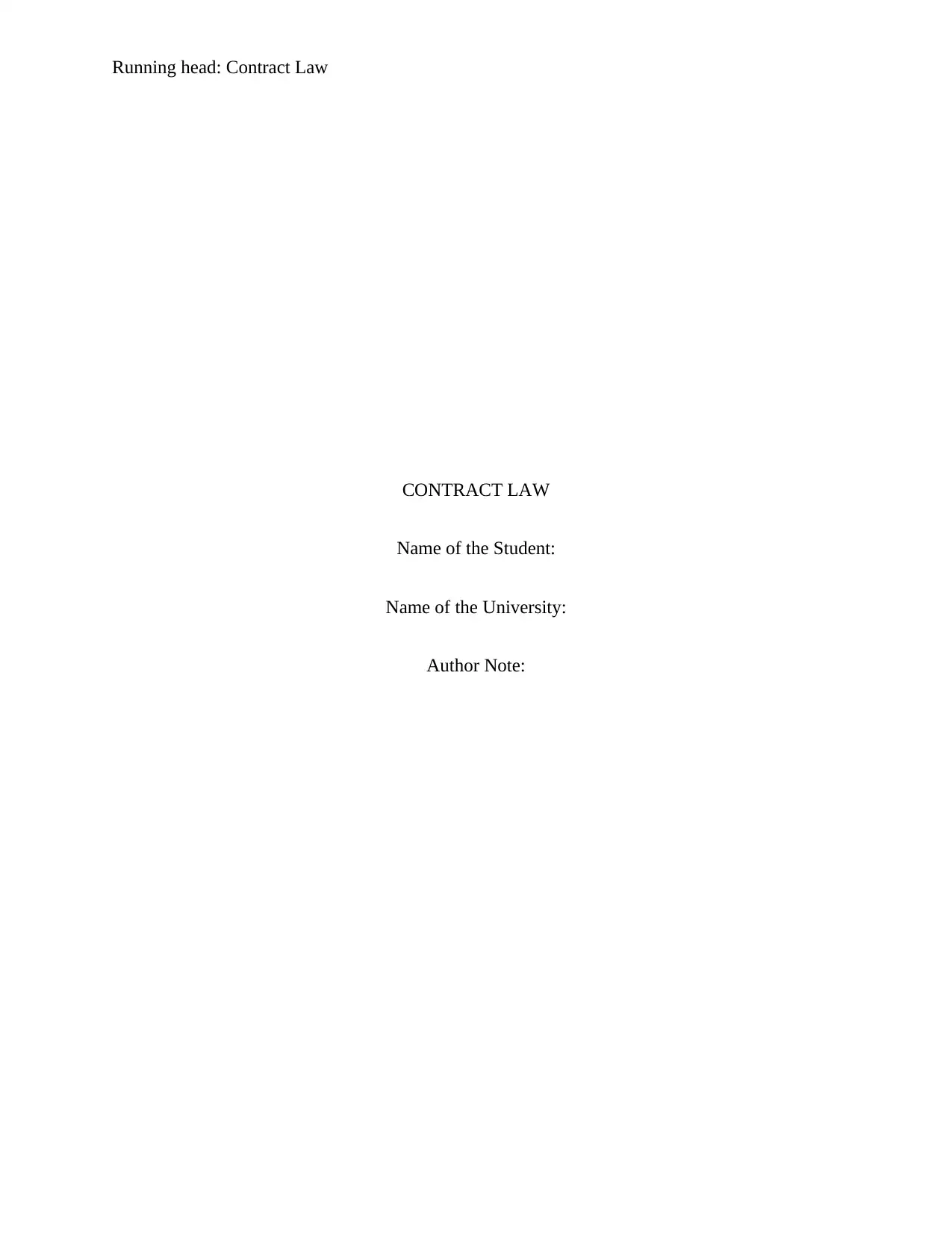
Running head: Contract Law
CONTRACT LAW
Name of the Student:
Name of the University:
Author Note:
CONTRACT LAW
Name of the Student:
Name of the University:
Author Note:
Paraphrase This Document
Need a fresh take? Get an instant paraphrase of this document with our AI Paraphraser
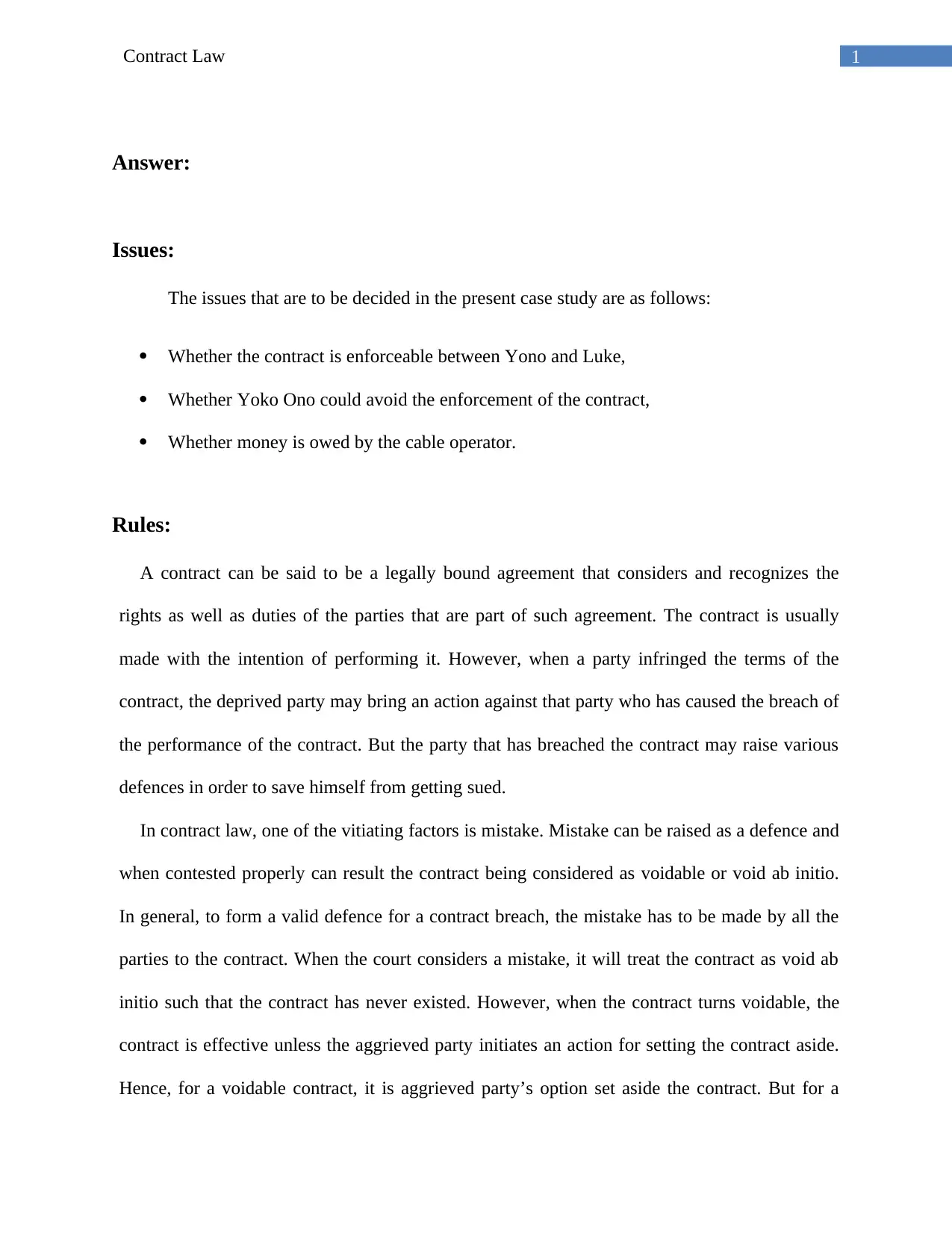
1Contract Law
Answer:
Issues:
The issues that are to be decided in the present case study are as follows:
Whether the contract is enforceable between Yono and Luke,
Whether Yoko Ono could avoid the enforcement of the contract,
Whether money is owed by the cable operator.
Rules:
A contract can be said to be a legally bound agreement that considers and recognizes the
rights as well as duties of the parties that are part of such agreement. The contract is usually
made with the intention of performing it. However, when a party infringed the terms of the
contract, the deprived party may bring an action against that party who has caused the breach of
the performance of the contract. But the party that has breached the contract may raise various
defences in order to save himself from getting sued.
In contract law, one of the vitiating factors is mistake. Mistake can be raised as a defence and
when contested properly can result the contract being considered as voidable or void ab initio.
In general, to form a valid defence for a contract breach, the mistake has to be made by all the
parties to the contract. When the court considers a mistake, it will treat the contract as void ab
initio such that the contract has never existed. However, when the contract turns voidable, the
contract is effective unless the aggrieved party initiates an action for setting the contract aside.
Hence, for a voidable contract, it is aggrieved party’s option set aside the contract. But for a
Answer:
Issues:
The issues that are to be decided in the present case study are as follows:
Whether the contract is enforceable between Yono and Luke,
Whether Yoko Ono could avoid the enforcement of the contract,
Whether money is owed by the cable operator.
Rules:
A contract can be said to be a legally bound agreement that considers and recognizes the
rights as well as duties of the parties that are part of such agreement. The contract is usually
made with the intention of performing it. However, when a party infringed the terms of the
contract, the deprived party may bring an action against that party who has caused the breach of
the performance of the contract. But the party that has breached the contract may raise various
defences in order to save himself from getting sued.
In contract law, one of the vitiating factors is mistake. Mistake can be raised as a defence and
when contested properly can result the contract being considered as voidable or void ab initio.
In general, to form a valid defence for a contract breach, the mistake has to be made by all the
parties to the contract. When the court considers a mistake, it will treat the contract as void ab
initio such that the contract has never existed. However, when the contract turns voidable, the
contract is effective unless the aggrieved party initiates an action for setting the contract aside.
Hence, for a voidable contract, it is aggrieved party’s option set aside the contract. But for a
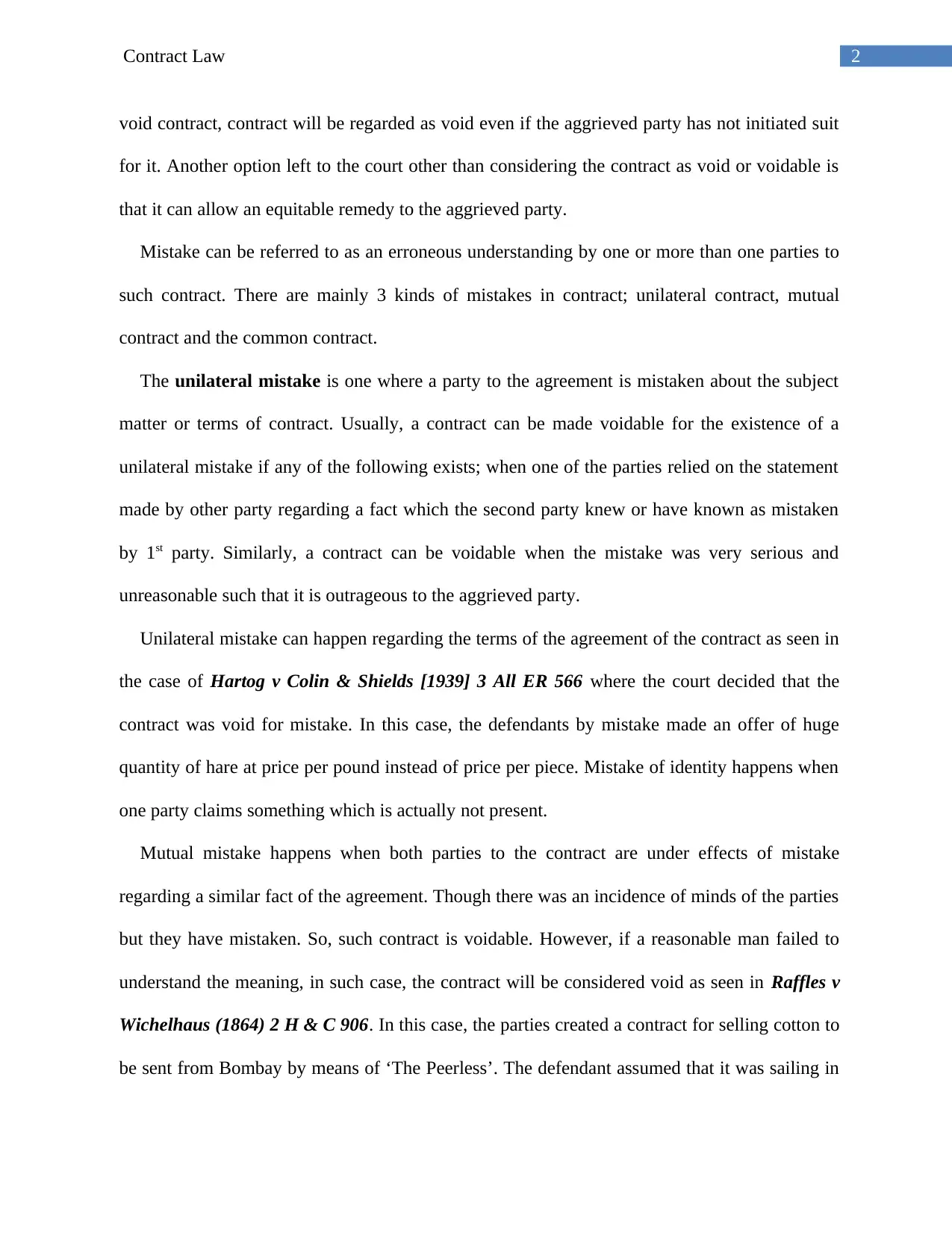
2Contract Law
void contract, contract will be regarded as void even if the aggrieved party has not initiated suit
for it. Another option left to the court other than considering the contract as void or voidable is
that it can allow an equitable remedy to the aggrieved party.
Mistake can be referred to as an erroneous understanding by one or more than one parties to
such contract. There are mainly 3 kinds of mistakes in contract; unilateral contract, mutual
contract and the common contract.
The unilateral mistake is one where a party to the agreement is mistaken about the subject
matter or terms of contract. Usually, a contract can be made voidable for the existence of a
unilateral mistake if any of the following exists; when one of the parties relied on the statement
made by other party regarding a fact which the second party knew or have known as mistaken
by 1st party. Similarly, a contract can be voidable when the mistake was very serious and
unreasonable such that it is outrageous to the aggrieved party.
Unilateral mistake can happen regarding the terms of the agreement of the contract as seen in
the case of Hartog v Colin & Shields [1939] 3 All ER 566 where the court decided that the
contract was void for mistake. In this case, the defendants by mistake made an offer of huge
quantity of hare at price per pound instead of price per piece. Mistake of identity happens when
one party claims something which is actually not present.
Mutual mistake happens when both parties to the contract are under effects of mistake
regarding a similar fact of the agreement. Though there was an incidence of minds of the parties
but they have mistaken. So, such contract is voidable. However, if a reasonable man failed to
understand the meaning, in such case, the contract will be considered void as seen in Raffles v
Wichelhaus (1864) 2 H & C 906. In this case, the parties created a contract for selling cotton to
be sent from Bombay by means of ‘The Peerless’. The defendant assumed that it was sailing in
void contract, contract will be regarded as void even if the aggrieved party has not initiated suit
for it. Another option left to the court other than considering the contract as void or voidable is
that it can allow an equitable remedy to the aggrieved party.
Mistake can be referred to as an erroneous understanding by one or more than one parties to
such contract. There are mainly 3 kinds of mistakes in contract; unilateral contract, mutual
contract and the common contract.
The unilateral mistake is one where a party to the agreement is mistaken about the subject
matter or terms of contract. Usually, a contract can be made voidable for the existence of a
unilateral mistake if any of the following exists; when one of the parties relied on the statement
made by other party regarding a fact which the second party knew or have known as mistaken
by 1st party. Similarly, a contract can be voidable when the mistake was very serious and
unreasonable such that it is outrageous to the aggrieved party.
Unilateral mistake can happen regarding the terms of the agreement of the contract as seen in
the case of Hartog v Colin & Shields [1939] 3 All ER 566 where the court decided that the
contract was void for mistake. In this case, the defendants by mistake made an offer of huge
quantity of hare at price per pound instead of price per piece. Mistake of identity happens when
one party claims something which is actually not present.
Mutual mistake happens when both parties to the contract are under effects of mistake
regarding a similar fact of the agreement. Though there was an incidence of minds of the parties
but they have mistaken. So, such contract is voidable. However, if a reasonable man failed to
understand the meaning, in such case, the contract will be considered void as seen in Raffles v
Wichelhaus (1864) 2 H & C 906. In this case, the parties created a contract for selling cotton to
be sent from Bombay by means of ‘The Peerless’. The defendant assumed that it was sailing in
⊘ This is a preview!⊘
Do you want full access?
Subscribe today to unlock all pages.

Trusted by 1+ million students worldwide
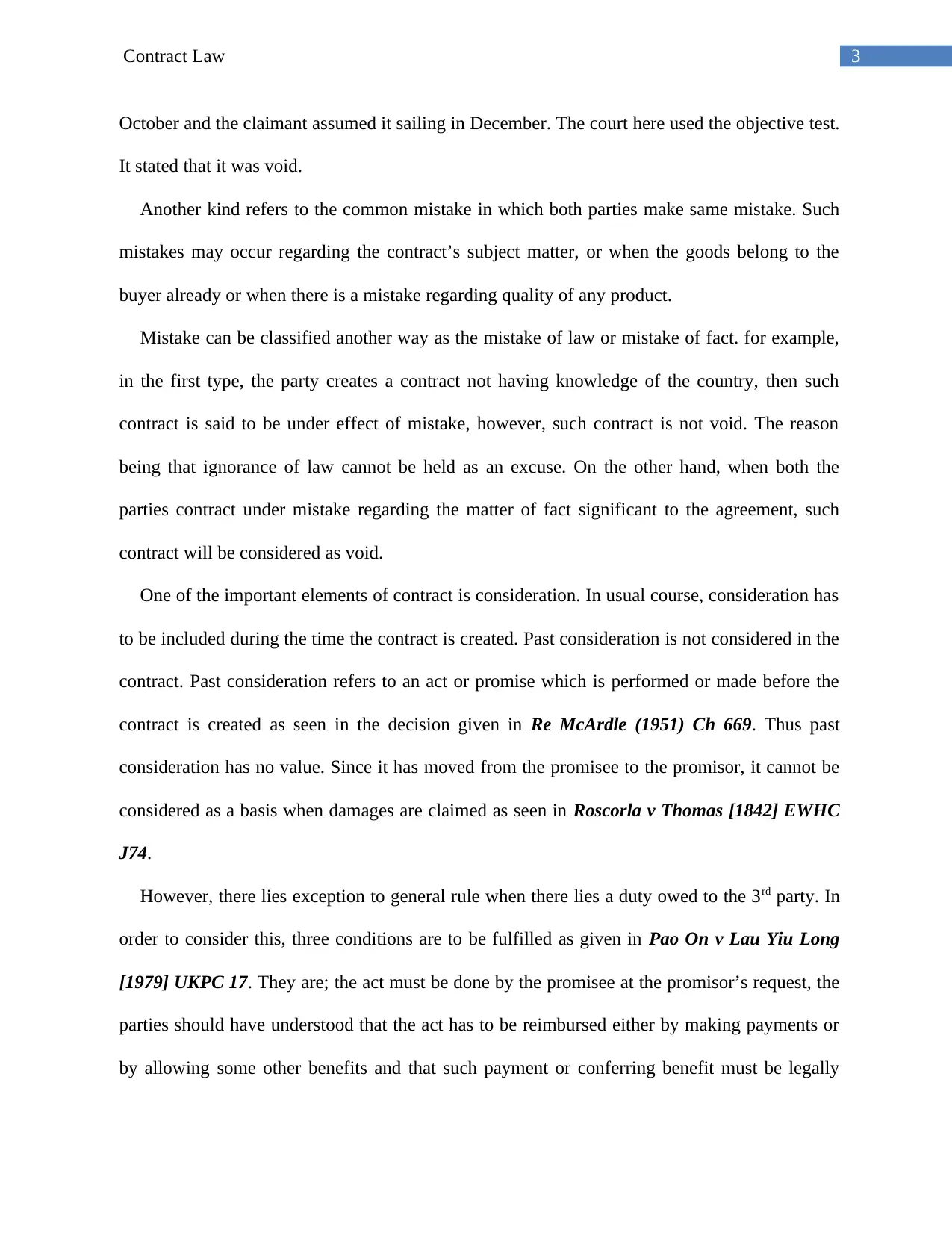
3Contract Law
October and the claimant assumed it sailing in December. The court here used the objective test.
It stated that it was void.
Another kind refers to the common mistake in which both parties make same mistake. Such
mistakes may occur regarding the contract’s subject matter, or when the goods belong to the
buyer already or when there is a mistake regarding quality of any product.
Mistake can be classified another way as the mistake of law or mistake of fact. for example,
in the first type, the party creates a contract not having knowledge of the country, then such
contract is said to be under effect of mistake, however, such contract is not void. The reason
being that ignorance of law cannot be held as an excuse. On the other hand, when both the
parties contract under mistake regarding the matter of fact significant to the agreement, such
contract will be considered as void.
One of the important elements of contract is consideration. In usual course, consideration has
to be included during the time the contract is created. Past consideration is not considered in the
contract. Past consideration refers to an act or promise which is performed or made before the
contract is created as seen in the decision given in Re McArdle (1951) Ch 669. Thus past
consideration has no value. Since it has moved from the promisee to the promisor, it cannot be
considered as a basis when damages are claimed as seen in Roscorla v Thomas [1842] EWHC
J74.
However, there lies exception to general rule when there lies a duty owed to the 3rd party. In
order to consider this, three conditions are to be fulfilled as given in Pao On v Lau Yiu Long
[1979] UKPC 17. They are; the act must be done by the promisee at the promisor’s request, the
parties should have understood that the act has to be reimbursed either by making payments or
by allowing some other benefits and that such payment or conferring benefit must be legally
October and the claimant assumed it sailing in December. The court here used the objective test.
It stated that it was void.
Another kind refers to the common mistake in which both parties make same mistake. Such
mistakes may occur regarding the contract’s subject matter, or when the goods belong to the
buyer already or when there is a mistake regarding quality of any product.
Mistake can be classified another way as the mistake of law or mistake of fact. for example,
in the first type, the party creates a contract not having knowledge of the country, then such
contract is said to be under effect of mistake, however, such contract is not void. The reason
being that ignorance of law cannot be held as an excuse. On the other hand, when both the
parties contract under mistake regarding the matter of fact significant to the agreement, such
contract will be considered as void.
One of the important elements of contract is consideration. In usual course, consideration has
to be included during the time the contract is created. Past consideration is not considered in the
contract. Past consideration refers to an act or promise which is performed or made before the
contract is created as seen in the decision given in Re McArdle (1951) Ch 669. Thus past
consideration has no value. Since it has moved from the promisee to the promisor, it cannot be
considered as a basis when damages are claimed as seen in Roscorla v Thomas [1842] EWHC
J74.
However, there lies exception to general rule when there lies a duty owed to the 3rd party. In
order to consider this, three conditions are to be fulfilled as given in Pao On v Lau Yiu Long
[1979] UKPC 17. They are; the act must be done by the promisee at the promisor’s request, the
parties should have understood that the act has to be reimbursed either by making payments or
by allowing some other benefits and that such payment or conferring benefit must be legally
Paraphrase This Document
Need a fresh take? Get an instant paraphrase of this document with our AI Paraphraser
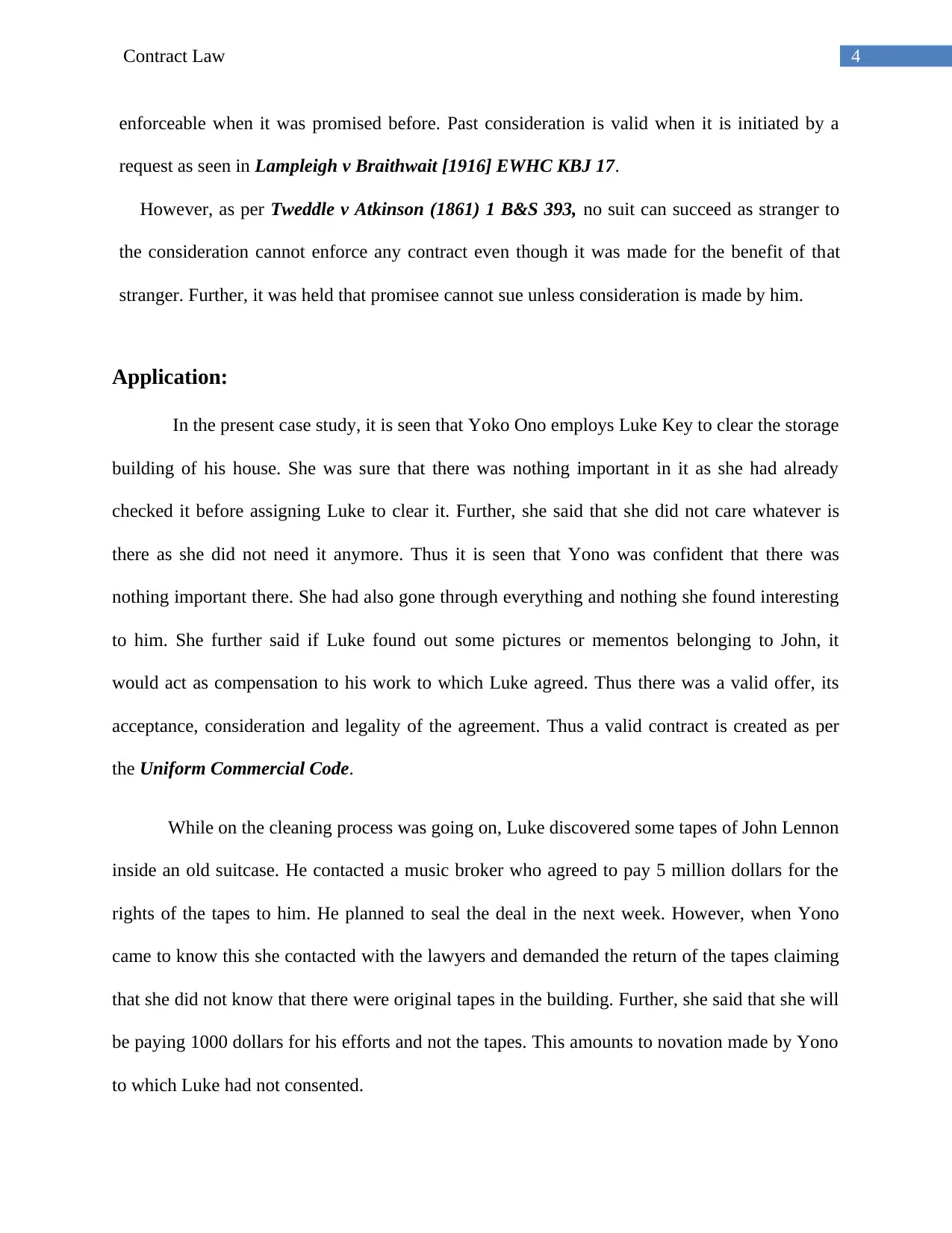
4Contract Law
enforceable when it was promised before. Past consideration is valid when it is initiated by a
request as seen in Lampleigh v Braithwait [1916] EWHC KBJ 17.
However, as per Tweddle v Atkinson (1861) 1 B&S 393, no suit can succeed as stranger to
the consideration cannot enforce any contract even though it was made for the benefit of that
stranger. Further, it was held that promisee cannot sue unless consideration is made by him.
Application:
In the present case study, it is seen that Yoko Ono employs Luke Key to clear the storage
building of his house. She was sure that there was nothing important in it as she had already
checked it before assigning Luke to clear it. Further, she said that she did not care whatever is
there as she did not need it anymore. Thus it is seen that Yono was confident that there was
nothing important there. She had also gone through everything and nothing she found interesting
to him. She further said if Luke found out some pictures or mementos belonging to John, it
would act as compensation to his work to which Luke agreed. Thus there was a valid offer, its
acceptance, consideration and legality of the agreement. Thus a valid contract is created as per
the Uniform Commercial Code.
While on the cleaning process was going on, Luke discovered some tapes of John Lennon
inside an old suitcase. He contacted a music broker who agreed to pay 5 million dollars for the
rights of the tapes to him. He planned to seal the deal in the next week. However, when Yono
came to know this she contacted with the lawyers and demanded the return of the tapes claiming
that she did not know that there were original tapes in the building. Further, she said that she will
be paying 1000 dollars for his efforts and not the tapes. This amounts to novation made by Yono
to which Luke had not consented.
enforceable when it was promised before. Past consideration is valid when it is initiated by a
request as seen in Lampleigh v Braithwait [1916] EWHC KBJ 17.
However, as per Tweddle v Atkinson (1861) 1 B&S 393, no suit can succeed as stranger to
the consideration cannot enforce any contract even though it was made for the benefit of that
stranger. Further, it was held that promisee cannot sue unless consideration is made by him.
Application:
In the present case study, it is seen that Yoko Ono employs Luke Key to clear the storage
building of his house. She was sure that there was nothing important in it as she had already
checked it before assigning Luke to clear it. Further, she said that she did not care whatever is
there as she did not need it anymore. Thus it is seen that Yono was confident that there was
nothing important there. She had also gone through everything and nothing she found interesting
to him. She further said if Luke found out some pictures or mementos belonging to John, it
would act as compensation to his work to which Luke agreed. Thus there was a valid offer, its
acceptance, consideration and legality of the agreement. Thus a valid contract is created as per
the Uniform Commercial Code.
While on the cleaning process was going on, Luke discovered some tapes of John Lennon
inside an old suitcase. He contacted a music broker who agreed to pay 5 million dollars for the
rights of the tapes to him. He planned to seal the deal in the next week. However, when Yono
came to know this she contacted with the lawyers and demanded the return of the tapes claiming
that she did not know that there were original tapes in the building. Further, she said that she will
be paying 1000 dollars for his efforts and not the tapes. This amounts to novation made by Yono
to which Luke had not consented.
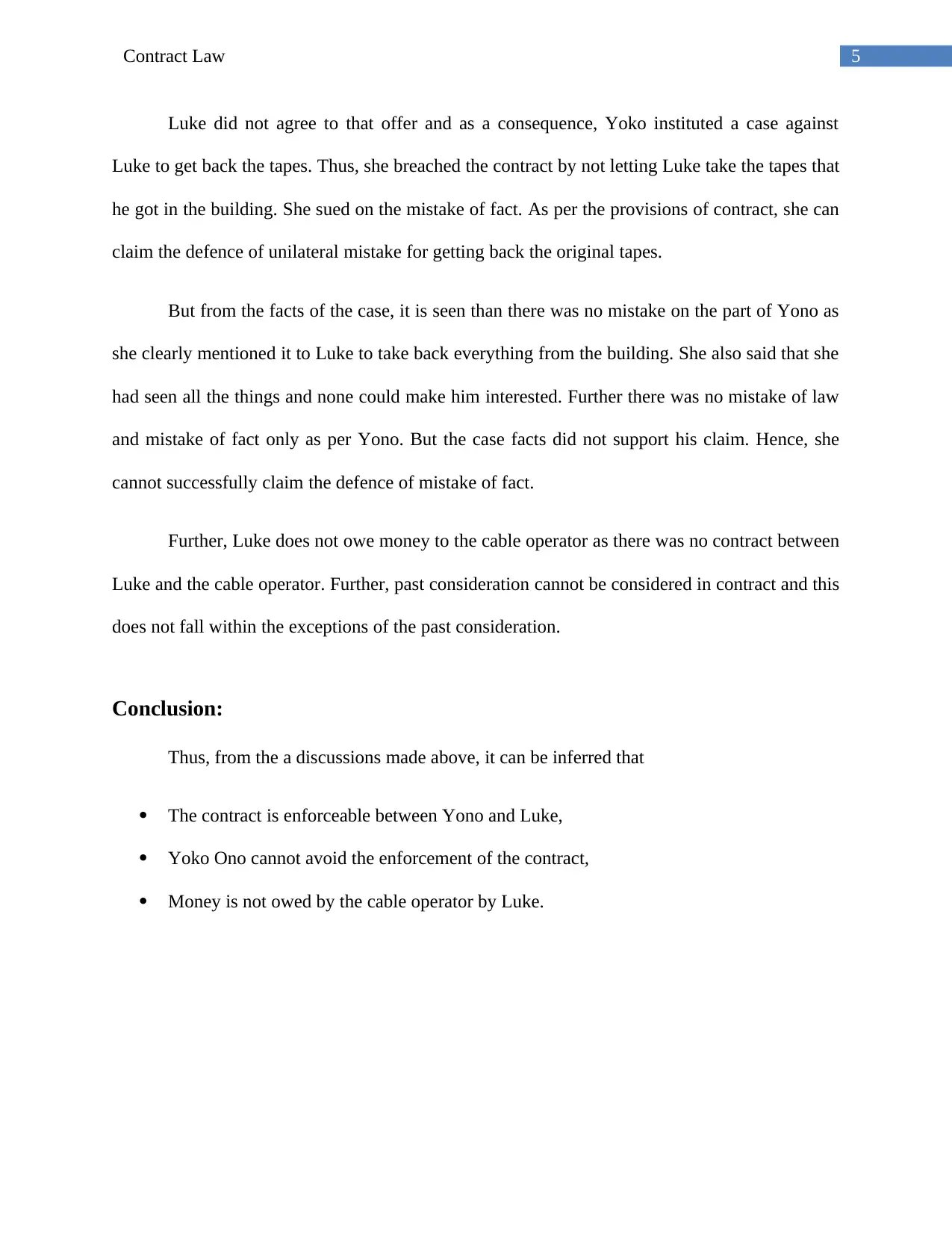
5Contract Law
Luke did not agree to that offer and as a consequence, Yoko instituted a case against
Luke to get back the tapes. Thus, she breached the contract by not letting Luke take the tapes that
he got in the building. She sued on the mistake of fact. As per the provisions of contract, she can
claim the defence of unilateral mistake for getting back the original tapes.
But from the facts of the case, it is seen than there was no mistake on the part of Yono as
she clearly mentioned it to Luke to take back everything from the building. She also said that she
had seen all the things and none could make him interested. Further there was no mistake of law
and mistake of fact only as per Yono. But the case facts did not support his claim. Hence, she
cannot successfully claim the defence of mistake of fact.
Further, Luke does not owe money to the cable operator as there was no contract between
Luke and the cable operator. Further, past consideration cannot be considered in contract and this
does not fall within the exceptions of the past consideration.
Conclusion:
Thus, from the a discussions made above, it can be inferred that
The contract is enforceable between Yono and Luke,
Yoko Ono cannot avoid the enforcement of the contract,
Money is not owed by the cable operator by Luke.
Luke did not agree to that offer and as a consequence, Yoko instituted a case against
Luke to get back the tapes. Thus, she breached the contract by not letting Luke take the tapes that
he got in the building. She sued on the mistake of fact. As per the provisions of contract, she can
claim the defence of unilateral mistake for getting back the original tapes.
But from the facts of the case, it is seen than there was no mistake on the part of Yono as
she clearly mentioned it to Luke to take back everything from the building. She also said that she
had seen all the things and none could make him interested. Further there was no mistake of law
and mistake of fact only as per Yono. But the case facts did not support his claim. Hence, she
cannot successfully claim the defence of mistake of fact.
Further, Luke does not owe money to the cable operator as there was no contract between
Luke and the cable operator. Further, past consideration cannot be considered in contract and this
does not fall within the exceptions of the past consideration.
Conclusion:
Thus, from the a discussions made above, it can be inferred that
The contract is enforceable between Yono and Luke,
Yoko Ono cannot avoid the enforcement of the contract,
Money is not owed by the cable operator by Luke.
⊘ This is a preview!⊘
Do you want full access?
Subscribe today to unlock all pages.

Trusted by 1+ million students worldwide
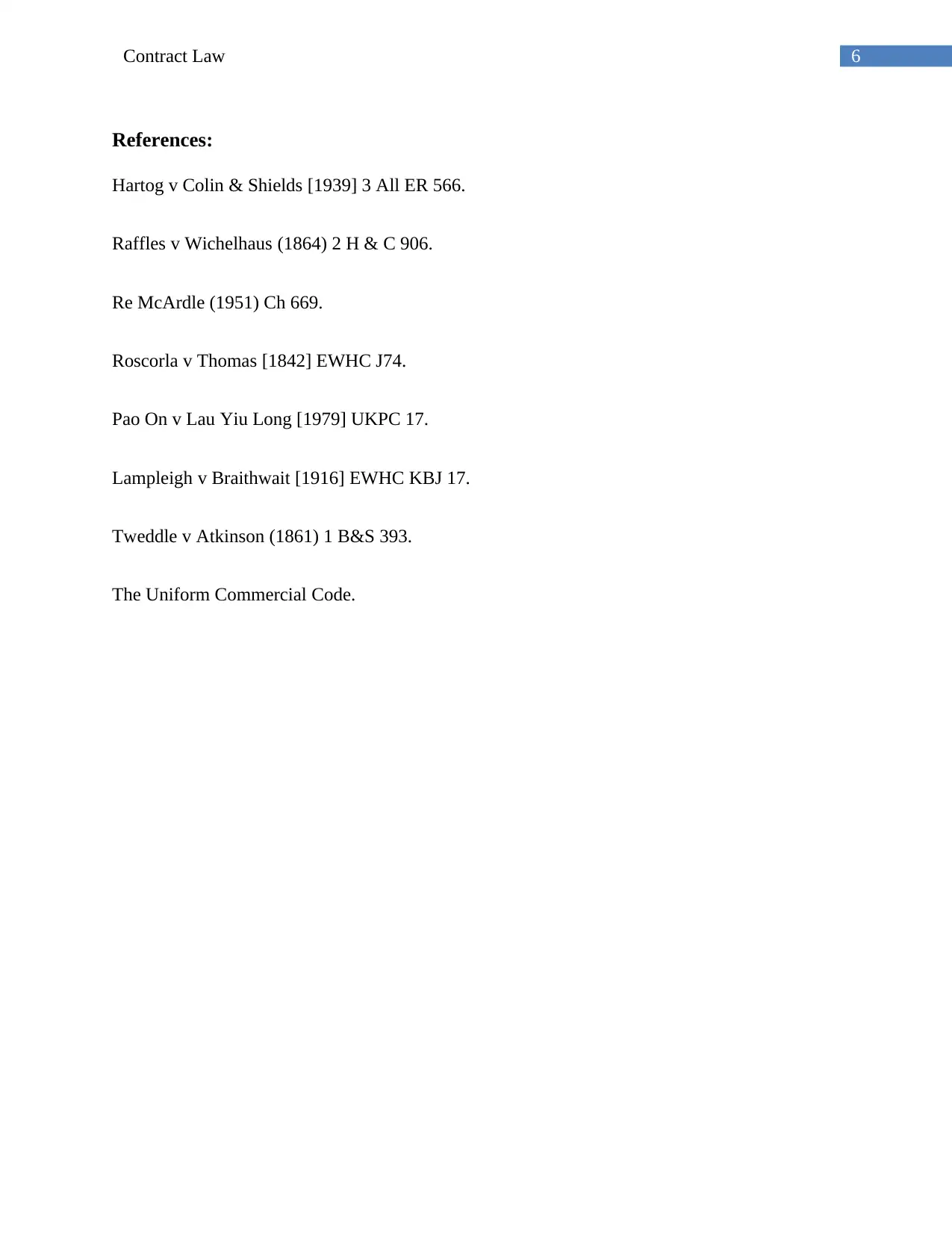
6Contract Law
References:
Hartog v Colin & Shields [1939] 3 All ER 566.
Raffles v Wichelhaus (1864) 2 H & C 906.
Re McArdle (1951) Ch 669.
Roscorla v Thomas [1842] EWHC J74.
Pao On v Lau Yiu Long [1979] UKPC 17.
Lampleigh v Braithwait [1916] EWHC KBJ 17.
Tweddle v Atkinson (1861) 1 B&S 393.
The Uniform Commercial Code.
References:
Hartog v Colin & Shields [1939] 3 All ER 566.
Raffles v Wichelhaus (1864) 2 H & C 906.
Re McArdle (1951) Ch 669.
Roscorla v Thomas [1842] EWHC J74.
Pao On v Lau Yiu Long [1979] UKPC 17.
Lampleigh v Braithwait [1916] EWHC KBJ 17.
Tweddle v Atkinson (1861) 1 B&S 393.
The Uniform Commercial Code.
1 out of 7
Related Documents
Your All-in-One AI-Powered Toolkit for Academic Success.
+13062052269
info@desklib.com
Available 24*7 on WhatsApp / Email
![[object Object]](/_next/static/media/star-bottom.7253800d.svg)
Unlock your academic potential
Copyright © 2020–2026 A2Z Services. All Rights Reserved. Developed and managed by ZUCOL.





